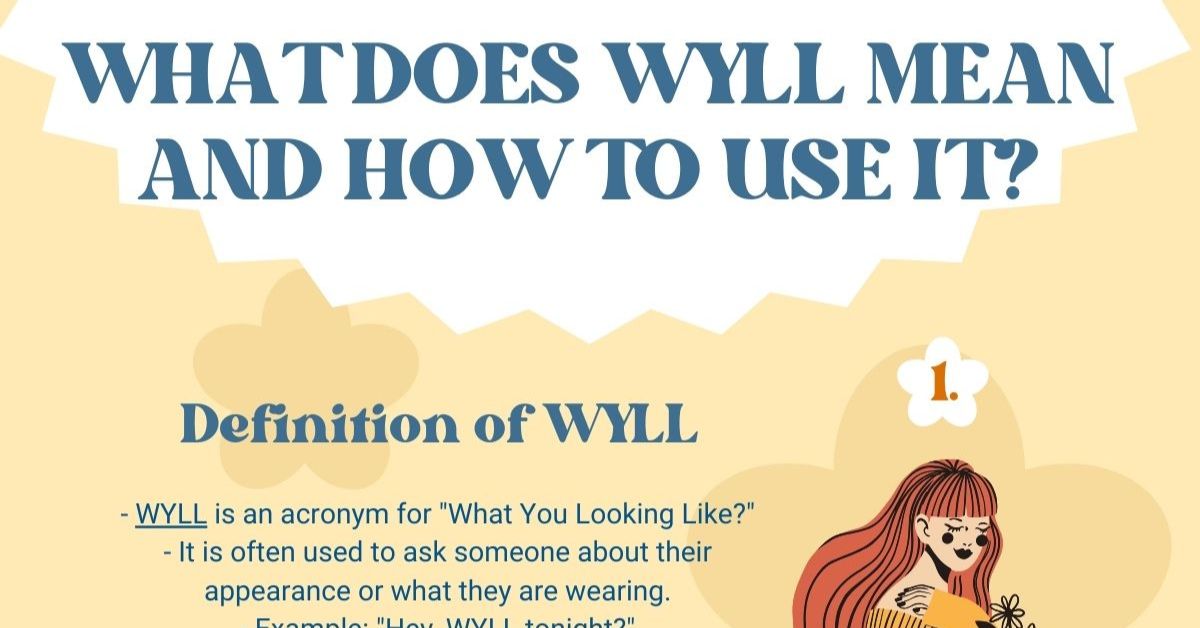In today’s fast-paced digital world, texting has become an essential mode of communication. With the rise of abbreviations and slang, it's easy to become confused by the myriad of terms that are frequently used. One such term is "wyll," which is often encountered in various online conversations. This article aims to delve into the "wyll meaning in text," exploring its origins, usage, and implications for interpersonal communication.
As we navigate through the complexities of modern communication, understanding the context and meaning of specific terms is crucial. The term "wyll" may appear in casual conversations, social media posts, or even in professional chats. However, its meaning can vary greatly depending on the context in which it is used. By gaining insight into the "wyll meaning in text," we can enhance our communication skills and engage more effectively with others.
Moreover, understanding such terms can help bridge generational gaps, as different age groups may use language differently. The youth, in particular, have a unique way of expressing themselves, and being familiar with terms like "wyll" can foster better connections. In this article, we will explore the various meanings of "wyll," its applications, and how it has evolved over time.
What is the Wyll Meaning in Text?
The term "wyll" is often used in informal texting and online communication. It is derived from the word "will," and can be interpreted as a casual way of expressing intention or willingness. For instance, when someone types "I wyll go to the party," they are indicating their intention to attend. However, the term can also carry different connotations depending on the context, such as expressing a future action or decision.
How is Wyll Used in Everyday Texting?
In everyday texting, "wyll" is primarily used among friends or peers to convey a sense of casualness and playfulness. It allows individuals to express their intentions without adhering to formal language. Here are some common scenarios where "wyll" might be used:
- Making plans: "I wyll meet you at the coffee shop."
- Expressing willingness: "I wyll help you with your homework."
- Indicating future actions: "I wyll call you later."
Is Wyll Considered Slang or Formal Language?
"Wyll" is considered slang, which means it is part of informal language often used in casual conversations. While it may not be appropriate for formal writing or professional settings, it has gained popularity in texting and social media. Using "wyll" can create a relaxed atmosphere, making communication feel more approachable and friendly.
Where Did the Term Wyll Originate?
The origin of the term "wyll" can be traced back to the evolution of language in the digital age. As texting and instant messaging became popular, users began to simplify language for the sake of convenience. This led to the creation of abbreviations, acronyms, and slang. "Wyll" emerged as a playful variation of "will," showcasing the creativity and adaptability of language.
Can Wyll Have Different Meanings in Different Contexts?
Yes, "wyll" can have different meanings depending on the context in which it is used. For example, while it generally indicates willingness or intention, it can also imply a casual invitation or suggestion. Understanding the context is crucial for interpreting the intended meaning accurately. Here are a few examples:
- In a casual chat: "Wyll you join us for dinner?" (invitation)
- In a planning conversation: "I wyll take care of the decorations." (commitment)
- In a playful exchange: "I wyll totally win this game!" (confidence)
How Can Understanding Wyll Improve Communication?
Understanding the "wyll meaning in text" can significantly enhance communication skills. By familiarizing oneself with contemporary slang and abbreviations, individuals can engage more effectively with peers, particularly younger generations. This understanding can lead to:
- Stronger connections: Relating to others using their language fosters camaraderie.
- Improved clarity: Knowing the meaning of terms like "wyll" can prevent miscommunication.
- Enhanced expressiveness: Using slang allows for more creative and varied expressions.
Are There Any Risks in Using Wyll?
While using slang like "wyll" can enhance casual conversations, it can also pose risks. Misunderstandings may arise if the recipient is unfamiliar with the term or its intended meaning. Additionally, using too much slang in formal settings can lead to a lack of professionalism. It’s essential to gauge the appropriateness of using "wyll" based on the audience and context.
Conclusion: Embracing Language Evolution
In conclusion, understanding the "wyll meaning in text" is a fascinating journey into the evolution of language in digital communication. As terms like "wyll" gain traction, they reflect the creativity and adaptability of human interaction. By embracing slang and informal language, we can foster better connections, enhance our communication skills, and navigate the complexities of modern relationships.
Ultimately, language is a living entity that continues to evolve. By staying informed and open to new terms, we can enrich our communication experience and connect with others on a deeper level.



